#UTM Machine Manufacturers
Explore tagged Tumblr posts
Text
Find Best UTM Machine Manufacturers
UTM Machine is specially manufactured by Peak Technology which has many years of experience in this field. Our UTM Machine is designed for testing metals and other materials under tension, compression bending, transverse and shear loads. Our company is counted most trustworthy UTM Machine Manufacturers.
Website: - https://peaktest.in/utm/
0 notes
Text
Top UTM Machine Manufacturers
Peak Test is established in the year 2010, we are most trusted and recognized for UTM Machine Manufacturers and Supplier. Our company is working with a skilful team member who is helping to design our products as per the requirements of our clients. UTM Machines used to determine the fracture toughness of materials, which is crucial for assessing their resistance to crack propagation and fracture
Click Here: - https://peaktest.in/utm/

0 notes
Text
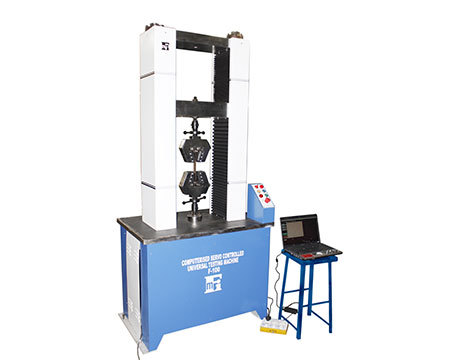
#acservocontrolledballscrewtypeuniversaltestingmachine#universaltestingmachine#utm#machine#manufacturer#supplier#fmi#finemanufacturing
0 notes
Text
A UTM machine, or Universal Testing Machine, is a crucial piece of equipment used to test the mechanical properties of materials. This versatile machine measures a material's tensile, compressive, and shear strength, making it essential in industries like construction, manufacturing, and research.
#utm machine#utm machine price#utm machine specification#utm machine benefits#best utm in India#universal testing machine#universal testing machine manufacturer
0 notes
Text
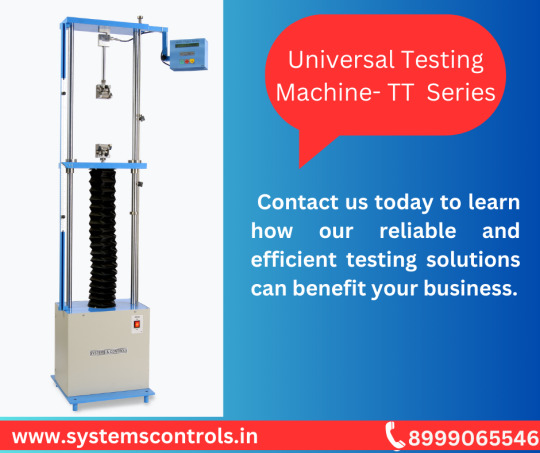
0 notes
Text
Computerized Universal Testing Machine With Servo System

Universal Testing Machine made by HSMLE india Corporation with various models like single columns, double columns, floor model, table top, door frame type etc., is used to perform tension, compression, flexure/bending, shearing, peeling, tear, cyclic etc., test for metal and non-metal specimens. This Series Floor Model & Dual Column testing systems provide simplicity, performance and affordability for quality control (QC) labs and production testing. These models are robust, heavy-duty frames commonly used for testing high-strength metals and alloys, advanced composites, aerospace and automotive structures, bolts, fasteners, and plate steels. Frames are available in load capacities of 10Kn to 300Kn; and several variations are available to accommodate requirements for both extended travel and extra wide test space.
#manufacture#industrial equipment#manufacturer#metallurgical#testing#metallographicequipments#utm#universal testing machine#universal testing machine supplier#universal testing machine manufacture#universal testing machine supplier in india#universal testing machine manufacture in india#universal testing machine supplier in delhi ncr#universal testing machine manufacture in delhi ncr#universal testing machine suppler in uttar pradesh#universal testing machine manufacture in uttar pradesh#universal testing machine specification#universal testing machine cost#universal testing machine price#universal testing machine services
1 note
·
View note
Text
All You Need To Know About Tensile Testing?

Today, there are many industries, like automotive, aerospace, and construction, where they use products that need to be durable and safe. For that, industry owners often seek help from tensile testing, which allows them to determine the durability and safety of their products, like metals, plastics, rubbers, and many others. This guide will talk about the essence of tensile testing, its types, and its benefits. Here we go!
What is Tensile Testing?
Tensile testing is a part of mechanical testing that aims to check the strength and flexibility of the product. A team of skilled professionals pulls the product unit it breaks. This helps manufacturers to know the durability and strength of the product. A cable can go through heavy tension in order to reveal its overall strength. Tensile testing helps manufacturers build safe products so that their products do not become risky for the workers who work with them. Products like metal sheets, plastic parts, rubber, wires, cables, textiles, and construction materials undergo these testing methods.
How is a Tensile Test Performed?
Tensile testing is one of the vital testing methods for quality control and safety assurance of the product. First, the environmental testing manufacturer of the product connects with the best testing laboratory. Experts use tools like a Universal Testing Machine (UTM), grips to hold specimens, extensometers for measuring elongation, and software for data analysis. They pull your material until it breaks to see how strong it is. This process helps manufacturers to build durable products for the industries.
The tensile testing method is an effective approach for industries like manufacturing, aerospace, and construction. With the help of tensile methods, material manufacturers can choose the right materials for their products. Testing experts provides you with useful data to improve product design and ensure the product meets customer needs. They perform this testing on metals, plastics, and composites to check their strength and how much force they can handle. This mechanical testing shows the changes or stretches that come in the material when it is pulled. It breaks to see how strong it is.
Benefits of Tensile Testing
Tensile testing is one of the most common types of mechanical testing methods. It determines the strength and ductility of the materials. It is important for metals, plastics, composites, and ceramics. A team of testers tests the product and identifies loopholes in extreme temperatures or dynamic loading. Let’s talk about the benefits of tensile testing:
Material Selection
One of the main advantages of tensile methods is the selection of the right materials. For example, in construction, materials must be strong and give proper support during use. If not, it can put workers' lives at risk or cause danger later. Hence, to avoid this, tensile testing is performed on the products to check the overall quality of the product. Manufacturers help in selecting the right material based on the strength and flexibility of the product.
Product Design Improvement
Connecting with the best testing laboratory allows manufacturers to gain access to the expertise and knowledge of specialists. That helps them to get advanced and in-depth data on their products. A team of testers performs a series of tests, like proof tests and pressure tests, to check how the product responds when going through these evaluation methods. With the help of tensile methods, manufacturers can identify the overall quality of their products. Overall, the data that testing lab experts provide to you help to enhance the design and performance of the material.
Quality Assurance
Laboratory testing provides quality assurance by performing a series of inspection methods on the device. They have a state-of-the-art laboratory to perform all the tests with advanced methods and technology. This helps you get in-depth reports about your product. And also gives you a chance to improve the quality of your product.
Tensile testing ensures that the product that you produce meets the required strength and safety standards. Manufacturers connect to ensure their products are compliant with local and global standards. This benefit from the company helps manufacturers to sell their products with confidence in the market, be it local or global.
Failure Analysis
Tensile is an effective approach because it also helps in the failure analysis of your product. For example, if you find your product is not performing as expected, tensile testing is one of the best ways to know how and where a material breaks when stretched. This testing reveals weak spots and gives the force that is needed to break it. Manufacturers take help from the Mechanical Testing Standard to know how the material behaves under stress. With this, you can improve the safety and identify weak points and reasons for material failure.
Applications of Tensile Strength Tester
Tensile strength testing is required for many industries to check how strong their materials are to reduce any risk or low performance of the product. Applications like automotive, construction, packaging, plastics, textiles, and aerospace industries are some of the appealing names where getting help from tensile testing methods is one of the major concerns. These industries connect with a testing lab to take their tensile testing services for their product testing. Tensile Strength Testers tests your items, like rubber bands, plastic bottles, metal wires, or fabric, to see how much force they can handle before breaking. For example, the automotive industry tests seatbelt strength to ensure the safety and quality of their products. They collect the data that comes out from the testing methods and focus on improving the overall quality of their products. They can choose the right materials and ensure the product meets the standards.
Conclusion
The tensile testing method is one of the state-of-the-art methodologies to help manufacturers and engineers to understand the properties of their materials. This testing method provides one of the biggest advantages in building a product that works as expected and does not risk the lives of the people working with it. This test gives in-depth information about products by exposing them to heavy pressure and stretch. Experts study their properties and prepare a report that mentions everything from their durability and performance to their response to heavy pressure and more. Obtaining in-depth data from tensile testing helps manufacturers create high-performing, reliable, and trustworthy products.
0 notes
Text
Delivering Excellence in Material Testing: The Journey of Suzuki Instruments and Its Universal Testing Machines
Since our establishment in 2009, Suzuki Instruments has steadily built a strong reputation as a trusted manufacturer, retailer and service provider of high-quality material testing equipment. With over a decade of industry experience, we have become a reliable name in the field of Universal Testing Machines (UTMs) — known for our precision, performance and commitment to quality.
At Suzuki Instruments, our mission is clear: to deliver top-tier, dependable products that help customers achieve accurate and repeatable results in their material testing processes. Our foundation is built on continuous innovation, strict quality standards and a deeply customer-focused approach.
Universal Testing Machines: The Backbone of Quality Control
Universal Testing Machines are essential tools in quality control, research and product development. They are used to determine the mechanical properties of materials such as metals, plastics, rubber, textiles and composites. Whether you’re testing for tensile strength, compression, elongation or flexural properties, a UTM delivers precise, consistent and reliable data.
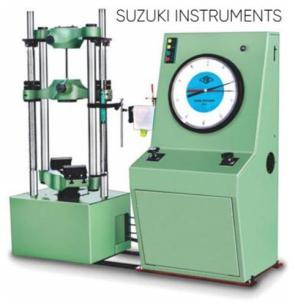
What Sets Suzuki Instruments Apart?
1. Built with Advanced Technology
We use performance-tested materials and the latest technology to manufacture our products. Our R&D team continuously enhances product capabilities to meet international standards such as ASTM, ISO and BIS.
Each machine is engineered with high-quality load cells, sensors and intuitive control systems, ensuring smooth operation and high measurement accuracy. We also offer powerful software for data tracking, analysis and reporting.
2. Unmatched Quality Control
Every Suzuki product undergoes rigorous testing before it reaches our customers. Our quality checks include mechanical calibration, software validation and performance verification under various conditions. This guarantees system integrity, long-term durability and ease of use.
Why Choose Suzuki Universal Testing Machines?
Our UTMs are trusted across industries for several key reasons:
Long Working Life — Built for durability, even in high-load environments
User-Friendly Operation — Intuitive interfaces and easy-to-learn software
Top Performance — Consistent, repeatable results across different materials
Low Maintenance — Designed to reduce downtime and upkeep costs
Cost-Effective — High value for money without compromising on quality
Whether you’re running an R&D lab, academic institute or a production facility, Suzuki Instruments delivers reliable performance at an affordable price.
Customer-Centric Advantages
We believe in building more than just machines — we build long-term partnerships with our clients. Here’s what makes working with Suzuki Instruments a seamless experience:
Prompt Delivery We ensure on-time shipping of fully tested and ready-to-use equipment.
Flexible Payment Options Our payment plans are designed to support businesses of all sizes.
Ethical Business Practices Transparent dealings with no hidden costs or fine print.
Dependable After-Sales Support Our technical support team is available to assist with installation, training and servicing — whenever you need it.
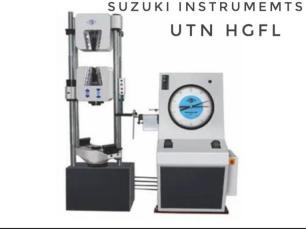
Industries We Serve
Our Universal Testing Machines are used in a wide range of applications, including:
Automotive — Testing metal components, plastic parts and vehicle materials
Construction — Evaluating concrete, rebar and structural elements
Educational Institutions — Supplying reliable equipment for lab training and academic research
Plastic & Rubber — Measuring tensile strength, elongation and tear resistance
Textiles — Ensuring quality and durability of yarns, fabrics and threads
Each industry comes with specific needs, which is why our machines are fully customizable with a variety of grips, extensometers, fixtures and software features.
Driving Innovation in Material Testing
Innovation is at the heart of Suzuki Instruments. Our development unit is constantly working on:
Enhancing digital control systems
Integrating touchscreen user interfaces
Supporting IoT compatibility for remote monitoring
Linking with cloud storage and ERP systems for seamless workflow integration
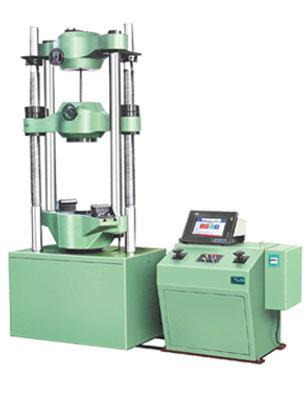
Universal Testing Machine Categories We Offer
We provide four major categories of UTMs, each suited to different applications and user preferences:
Analogue Universal Testing Machines Simple, mechanical systems with manual reading capabilities — ideal for basic and budget-conscious testing environments.
Electronic Universal Testing Machines Digitally enhanced machines with electronic displays for better accuracy and easier data reading.
Computerized Touch Screen Universal Testing Machines Advanced systems with built-in software and touchscreen controls — perfect for high-precision environments and automated reporting.
Electro-Mechanical Universal Testing Machines These machines combine mechanical strength with electronic precision, offering reliable results across a wide variety of materials.
At Suzuki Instruments, we don’t just supply machines — we deliver confidence, precision and value. With a proven track record since 2009 and a commitment to ongoing innovation, we proudly support industries, institutions and labs across the country.
Whether you’re setting up a new testing lab or upgrading your equipment, Suzuki Instruments is your trusted partner in material testing — where precision meets performance.
0 notes
Text
From Doodles to Deployment: Our Journey into Physics-Guided Machine Vision
A few years ago, we started exploring AI with curiosity, dabbling in low-code/no-code tools, open-source packages, and testing out ideas to solve real problems. As our focus is primarily the manufacturing space, the excitement quickly met reality: reliable data was scarce, and accuracy couldn’t be a maybe. In production, a model either works or it doesn’t—there’s no room for ambiguity.
Coming from a mechanical engineering background, we kept asking: how do we trust a prediction if we can’t explain it? That’s what led us to evolve our thinking from pure data-driven models to Physics-Guided AI. Instead of treating model building as a standard pipeline, we began incorporating domain understanding, physics-based reasoning, and system constraints into our approach. It wasn’t just about models, it became a multi-stage workflow that blended image processing, regression, and contextual rules driven by how things actually work.
When we stepped into machine vision for inspections, we noticed a gap. Pre-trained models and vision platforms were available, but they often stopped short of delivering end-to-end solutions. Customers didn’t want components; they wanted working systems.
That’s where our approach made the difference. We applied the same physics-guided principles to machine vision solving tough inspection challenges and integrating them fully with machine control systems. At Automate 2025, this approach resonated deeply. Our live demo, featuring a smart, vision-enabled upgrade of a syringe testing system (UTM) for auto-injectors, caught attention for its practicality and execution.
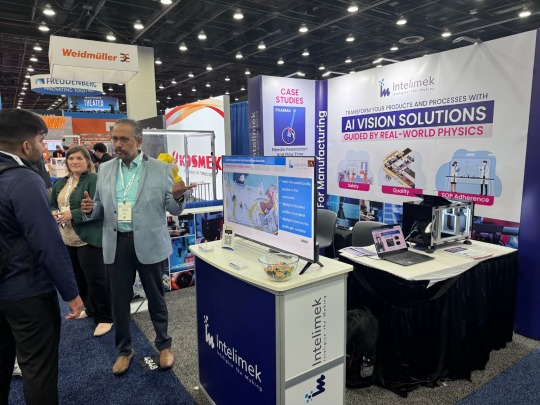
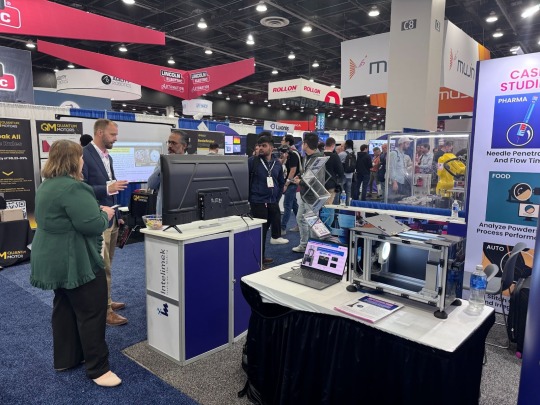
This wasn’t just another proof of concept. It was a real transformation turning a traditional test system into a precise, automated inspection unit for healthcare devices.
Check out the full story in our latest blog.
Why Intelimek
At Intelimek, we transform existing equipment and processes into smart, vision-enabled systems by integrating machine vision with physics-guided AI. Instead of isolated tools, we deliver end-to-end solutions that combine domain knowledge, image intelligence, and control logic. Know more about our success stories.
0 notes
Text
Enhancing Product Reliability with High-Tech Steel Testing Lab Instruments
In the world of modern engineering, construction, and manufacturing, product reliability is a non-negotiable standard. At the heart of that reliability lies the material quality—especially when it comes to steel. Whether it's used in skyscrapers, bridges, automotive parts, or industrial machinery, steel must perform under pressure, resist wear, and deliver consistent strength. This is where steel testing lab instruments play a pivotal role, enabling industries to assess and validate the quality of their steel with precision and confidence.
The Critical Role of Steel Testing in Quality Assurance
Steel is subjected to various stresses during its lifecycle. From thermal fluctuations to mechanical strain, the material must withstand rigorous conditions. To ensure this, quality assurance teams rely on advanced testing instruments to evaluate properties like tensile strength, yield strength, elongation, hardness, impact resistance, and fatigue. High-tech steel testing equipment provides accurate, repeatable data that ensures only top-grade materials are used in critical applications—drastically reducing the risk of failure or malfunction.
Technological Advancements Transforming Steel Testing
The field of materials testing has evolved dramatically, and so have the instruments used in labs. Today, steel testing lab equipment manufacturers are incorporating digital interfaces, automation, and real-time data analytics into their instruments. Machines like universal testing machines (UTMs), Charpy impact testers, and hardness testers are now smarter, faster, and more reliable than ever. These advancements not only improve testing accuracy but also boost operational efficiency and traceability in production environments.
Supporting Innovation in Engineering and Design
Reliable steel testing is not just about meeting minimum standards—it's also a catalyst for innovation. Engineers use precise testing data to design lighter, stronger, and more efficient products. For example, in the automotive sector, materials with high strength-to-weight ratios are crucial for fuel efficiency. In infrastructure, long-span bridges and high-rise buildings require steels that pass through a series of mechanical and structural tests. The accurate feedback from testing instruments helps in pushing design boundaries while maintaining safety.
Ensuring Compliance with Industry Standards
Global industries operate under strict material testing standards such as ASTM, ISO, and BIS. Non-compliance can result in structural failure, legal liabilities, or damage to brand reputation. With high-tech steel testing lab instruments, manufacturers can ensure every batch of steel meets the required specifications. Reputable steel testing lab equipment manufacturers offer machines that are built to meet and exceed these global standards, thereby simplifying compliance and certification processes.
The Importance of Choosing Trusted Manufacturers
The reliability of your steel testing results depends significantly on the quality of your equipment. That’s why it’s essential to collaborate with experienced and certified steel testing lab equipment manufacturers. A dependable manufacturer provides more than just equipment—they deliver ongoing support, calibration services, software updates, and expert training. Their commitment to innovation and precision ensures that your lab remains at the forefront of material testing.
Conclusion: Testing Today for a Safer Tomorrow
As industries continue to raise the bar for safety, performance, and sustainability, high-tech steel testing instruments are becoming indispensable. These tools ensure that every steel product used in critical structures or machinery has been rigorously tested for reliability. With the expertise of trusted steel testing lab equipment manufacturers, industries can not only meet today’s demanding standards but also pave the way for future advancements in engineering and design.
1 note
·
View note
Text
Top Universal Testing Machine Manufacturers
Are you looking for high-quality of Universal Testing Machine in bulk at an affordable price? If, yes then must contact Peak Test which has many years of experience in this field. We are trusted and recognized name for Universal Testing Machine Manufacturers and suppliers. Universal Testing Machine is extensively used to perform tensile, compression, flexural, and shear tests on various materials such as metals, plastics, rubber, textiles, ceramics, composites, and construction materials like concrete and asphalt.
Visit here: - https://peaktest.in/utm/

0 notes
Text
Understanding Tensile Strength Testing for Fibres and Filaments
In the textile manufacturing industry, ensuring the strength and durability of fibres and filaments is critical to producing high-quality fabrics. One of the most essential tests performed on these raw materials is tensile strength testing. This test determines how much stress a fibre or filament can withstand before breaking, providing vital insights into its suitability for various textile applications.
This blog will delve into the fundamentals of tensile strength testing for fibres and filaments, its significance, the testing procedures, and how the results impact textile quality and manufacturing processes.
What Is Tensile Strength Testing?
Tensile strength testing measures the maximum force a fibre or filament can endure while being stretched before it breaks. This mechanical property is a direct indicator of the material’s durability and resistance to stress during processing and end use.
In simple terms, tensile strength testing helps answer: “How strong is this fibre or filament when pulled?”
Why Is Tensile Strength Testing Important for Fibres and Filaments?
1. Ensuring Fabric Durability
The tensile strength of individual fibres and filaments directly influences the overall strength of yarns and fabrics. If the fibres are weak, the fabric may tear easily during manufacturing or use, reducing product lifespan.
2. Optimizing Manufacturing Processes
Understanding the tensile strength enables manufacturers to optimize spinning, weaving, and knitting processes by selecting fibres that can withstand mechanical stresses during production without breaking.
3. Quality Control and Compliance
Tensile strength testing is a critical quality control step, ensuring fibres meet industry and regulatory standards such as ISO, ASTM, and AATCC. This compliance helps textile products gain acceptance in competitive markets worldwide.
4. Material Selection and Innovation
For developing new textile blends or innovative fibres, tensile strength testing provides essential data on performance under tension, aiding in material selection for specialized applications like technical textiles or performance wear.
How Is Tensile Strength Testing Conducted?
1. Sample Preparation
The test begins by preparing fibre or filament samples of a specified length, usually conditioned under controlled temperature and humidity to ensure consistent results.
2. Testing Equipment
A Universal Testing Machine (UTM) or similar tensile tester is used. It applies a controlled tensile force to the sample at a constant rate until the fibre or filament breaks.
3. Test Procedure
The fibre or filament is clamped securely between two grips.
The machine pulls the sample apart gradually.
The applied force and elongation are continuously recorded.
4. Key Measurements
Breaking Force (Maximum Load): The highest force applied before the fibre breaks.
Elongation at Break: The amount the fibre stretches before breaking, expressed as a percentage of its original length.
Tensile Strength: Calculated by dividing the breaking force by the cross-sectional area of the fibre or filament, usually expressed in megapascals (MPa).
Types of Tensile Strength Tests for Fibres and Filaments
Depending on the fibre type and testing standards, different methods may be used:
Single Fibre Tensile Test: Measures the strength of an individual fibre or filament, providing precise mechanical property data.
Bundle Tensile Test: Tests a group of fibres together, often used for yarns or fibre bundles where single fibre testing is challenging.
Dynamic Tensile Test: Evaluates tensile properties under varying strain rates or repeated loading, useful for performance textiles.
Factors Influencing Tensile Strength of Fibres and Filaments
Material Composition: Natural fibres (cotton, wool) and synthetic fibres (polyester, nylon) have different inherent tensile strengths.
Fibre Diameter: Thinner fibres may have lower breaking forces but can offer higher strength-to-weight ratios.
Moisture Content: Fibres absorb moisture which can affect their tensile properties; hence conditioning is essential before testing.
Surface Defects: Microscopic damage or irregularities weaken fibres and reduce tensile strength.
Processing History: Heat treatment, chemical exposure, or mechanical stress during manufacturing can impact strength.
Interpreting Tensile Strength Test Results
1. High Tensile Strength
Indicates fibres capable of withstanding significant stress without breaking. Ideal for durable textiles such as upholstery, industrial fabrics, and activewear.
2. Low Tensile Strength
Suggests fibres prone to breakage and less suitable for high-stress applications. May be acceptable for lightweight or decorative textiles.
3. Elongation Properties
Fibres with good elongation at break can absorb energy and stretch without failure, contributing to fabric flexibility and comfort.
Benefits of Tensile Strength Testing in Textile Manufacturing
Improved Product Quality: Guarantees textiles made with fibres that withstand daily wear and manufacturing stresses.
Reduced Material Waste: Identifies substandard fibres early, preventing defects and reprocessing costs.
Enhanced Consumer Satisfaction: Durable textiles translate into higher customer trust and brand loyalty.
Compliance with International Standards: Facilitates access to global markets by meeting quality benchmarks.
Supports Research and Development: Enables innovation in fibre blends and new textile products with desired mechanical properties.
Industry Standards for Tensile Strength Testing
Leading organizations define standardized procedures for tensile testing:
ISO 2062: Yarn tensile testing for synthetic and natural fibres.
ASTM D2256: Test method for tensile properties of yarns from textile fibres.
AATCC Test Method 127: Measures tensile strength and elongation of fibres and yarns.
Adhering to these standards ensures accuracy, repeatability, and acceptance of test results internationally.
Choosing a Reliable Fibre and Filaments Testing Lab
Selecting a certified testing lab with advanced tensile testing equipment is essential for accurate results. Key factors to consider:
Accreditation: Look for ISO/IEC 17025 accreditation to ensure competence.
Experienced Technicians: Skilled professionals with textile testing expertise.
Comprehensive Reporting: Clear interpretation and actionable recommendations.
Fast Turnaround: Timely delivery of results to keep production on schedule.
Conclusion
Tensile strength testing for fibres and filaments is a fundamental procedure that significantly impacts textile manufacturing. It provides essential data on the mechanical properties of fibres, ensuring they meet quality standards and perform well during processing and in finished products.
By understanding tensile strength and integrating rigorous testing into quality control, textile manufacturers can produce durable, high-quality fabrics that satisfy customer demands and comply with global standards. Whether working with natural or synthetic fibres, tensile testing remains a cornerstone for innovation, reliability, and success in the textile industry.
#fibre and filaments testing#fibre testing#filaments testing#testing lab near me#testing lab in delhi
0 notes
Text
Universal Testing Machine | Testing Machines | Tensile Testing Machine, Brinell, Rockwell, Vickers Hardness Testing Machine supplier, Manufacturer, Wholesaler in South Africa, Kenya, Serbia, Greece, Turkey, Israel, Malaysia, Indonesia, Thailand, Singapore, Jordan, Bangladesh, Brazil, South Korea, france, Uk, Netherlands, Russia, Australia, USA, Italy, Poland, Portugal, India, UAE, Saudi Arabia, Kuwait, Oman

Fine Manufacturing Industries is the best Universal Testing Machine, Testing Machines, Tensile Testing Machine, Brinell Hardness Testing Machine, Rockwell Hardness Testing Machine, Vickers Hardness Testing Machine, Portable Hardness Testing Machines supplier, Manufacturer, Wholesaler in South Africa, Kenya, Serbia, Greece, Turkey, Israel, Malaysia, Indonesia, Thailand, Singapore, Jordan, Bangladesh, Brazil, South Korea, france, Uk, Netherlands, Russia, Australia, USA, Italy, Poland, Portugal, India, UAE, Saudi Arabia, Kuwait, Oman
#manufacturer#supplier#fmi#finemanufacturing#universaltestingmachine#universaltesting#machine#utm#universal#testingmachines#tensiletestingmachine#brinell#rockwell#vickershardnesstestingmachine#vickershardnesstest
0 notes
Text
Universal Testing Machines (UTM) play a critical role in ensuring that products meet the necessary strength and durability standards before reaching the market. By measuring mechanical properties like tensile strength, compression, bending, and shear, UTM machines help manufacturers and engineers ensure that materials and finished products are strong enough to withstand real-world conditions.
#UTM Machine#UTM Features#UTM Machine Price#Universal Testing Machines#Universal Testing Machines Supplier#Universal Testing Machines Manufacturer#Universal Testing Machines Price#UTM Machine in India
0 notes
Text
Guide To choose the Right Tensile/Compression Strength Testing Machine
Despite the fact that Tensile/Compression strength testing machines are and utilized pretty much in every industry there is still absence of information with regards to buying the right machine. Given the scope of items, the features and the variations in cost getting one can be a bit overwhelming and this becomes especially true for non -standard applications.
One of the inquiries we get posed to by our clients is whether to pick a manually operated machine or motorized one and if motorized is chosen, would it be a good idea for us we pick a machine with Computer Control and inclusive of data acquisition. So, we should check out at this according to a point of view of a spring manufacturer.
There are two elements which go with this choice simpler. The first and most clear one is the price. Manually operated machines are less expensive obviously, then motorized lastly computerized. In any case, in the event that you are taking a heavier spring which are utilized in train bogies or airplanes, then, at that point, motorized ones must be utilized no matter what the budget. Imaging putting a pressure power of 5000 kg on a spring, (for example, the ones utilized under the train bogies) with a hand wheel. Indeed, even with utilization of a geared 3 train it's diligent effort.
Whenever that is chosen, the other element which is significant is the volume of testing. A spring manufacturer can let out a huge number of springs a day. The question then is whether to do batch testing or 100% testing. Batch testing is where you pick a couple of tests from the batch, test them and assuming all are good you say that the entire batch is good. In such cases a manual machine would be satisfactory. However, if one wants to test several thousand springs a day it's smarter to go for a motorized machine and reduce the burden of manual labour on the machine operator.
So, we decided on a manual or motorized machine. Subsequent stage in the development is whether to get a computer-controlled machine. These are machines operated straightforwardly from the computer and give the testing output as a force versus displacement chart. This imagines the way of behaving of the spring constantly. Regularly these software’s also provide a statistical report for all the tests, so min, max, standard deviation etc. and so forth. Are accessible as reports. Any large organizations where the report should be imparted to the higher ups who just need an outline of the production quality, these machines are a good decision. Any new product requiring data for approval must be tested on such machines. In many cases the client request that the manufacturer present the report online or in pdf format to avoid any possibility of manipulation. The best way to avoid from this is to utilize a computerized machine.
In specific cases the product you manufacture dictates the type of machine, there are ASTM, IS norms which settle on the decision for you. Be that as it may, for situations where it’s a non-standard product, we trust this article assists you with choosing what's best for you.
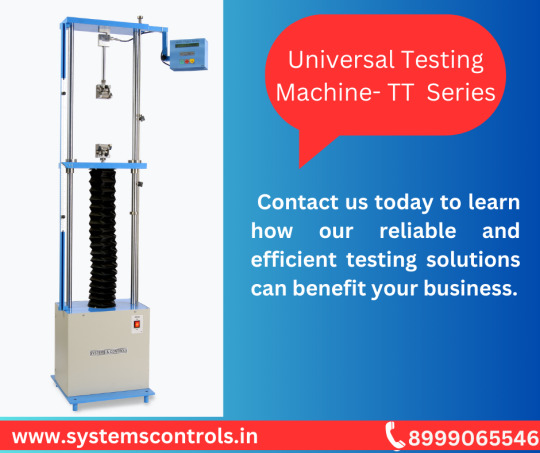
#utm#tensile#compressiontesting#stm#spring#universal testing machine manufacturers#mechanical engineering#manufacturer#springtesting#tensile testing machines
0 notes
Text
TMT Saria Manufacturing Process Explained

Understanding how TMT Saria is made isn’t just for engineers—it's crucial for anyone involved in construction. A trusted TMT saria manufacturer ensures that each bar is built for resilience, safety, and long-term performance. And that reliability starts deep within the manufacturing process. Choosing the right TMT saria often comes down to knowing what goes into it and why it matters.
Introduction to TMT Saria
TMT stands for thermo-mechanically treated bars. These are high-electricity reinforcement bars with a hard outer middle and gentle internal core—designed for advanced electricity and versatility. TMT saria has become the standard choice in modern construction, whether for high-rise buildings or highway bridges.
Why the Manufacturing Process Matters
Each phase in making a TMT bar directly affects its structural properties. A precisely controlled process means better bendability, corrosion resistance, and earthquake resilience—qualities that depend on much more than just raw materials.
Raw Materials Used in TMT Saria
To make top-grade TMT bars, producers start with high-quality iron ore, coal, and limestone. The blend determines the steel’s electricity, consistency, and long-term reliability.
Primary Inputs for Strength and Durability
Low-impurity iron ore ensures reduced brittleness. The right carbon blend and alloying elements like chromium and vanadium upload durability without compromising on flexibility.
Step-by-Step Manufacturing Process
Step 1: Iron Ore Selection and Processing
Raw materials are carefully selected and processed in blast furnaces. The impurities are separated to produce pure molten steel.
Step 2: Heating in the Blast Furnace
The furnace heats the iron to over 1700°C. Controlled heating guarantees the right carbon content material and starts forming the steel’s inner grain shape.
Step 3: Rolling into Desired Shape
The warm steel is passed through a sequence of rolling stands, regularly reworking it into long, ribbed bars of precise diameters.
Step 4: Quenching—The Key to TMT Bars
This is where things get interesting. The hot-rolled bar passes through a water spray system, cooling only the outer layer rapidly while keeping the core hot. This creates a strong surface and a ductile core.
Step 5: Self-Tempering Process
After quenching, the bar’s inner heat tempers the outer martensite layer. This improves elasticity and prevents cracks under load.
Step 6: Atmospheric Cooling
Finally, bars are cooled in ambient air, allowing the core to become softer and more malleable—perfect for seismic zones and heavy loads.
Importance of the Quenching and Tempering Process
This dual process is what gives TMT bars their signature structure. A hard exterior resists mechanical damage, while the soft core handles pressure and movement without snapping.
Core Strength vs. Surface Hardness
It’s the balance between these two properties that makes TMT saria more reliable than older rebar types. Weak core? The bar breaks. Weak surface? It corrodes. A good TMT saria manufacturer strikes that perfect balance.
Role of a Reliable TMT Saria Manufacturer
A dependable manufacturer isn’t just a vendor. It’s a partner in every foundation, beam, and column.
Precision, Quality Control, and Certification
The best manufacturers follow BIS norms, conduct lab testing, and ensure every batch matches specifications before dispatch.
Consistency in Supply
On-time delivery and consistent quality are as important as the steel itself—especially for large infrastructure projects.
How TMT Bar Manufacturers Ensure Quality
Trusted TMT bar manufacturers follow strict quality checks from raw material selection to final product dispatch. Their facilities include spectrometers, UTM machines, and other advanced tools for quality assurance.Every lot is tested for tensile strength, elongation, and chemical composition. Certified labs confirm adherence to BIS standards before it reaches a construction site.
Final Thoughts
A strong structure begins with strong material. Understanding the TMT saria manufacturing process empowers builders, engineers, and decision-makers to choose smarter and safer. Working with a proven TMT saria manufacturer ensures that every bar you use is up to the mark—because every detail in the process counts.
#TMT bar process#Saria making#Steel manufacturing#TMT production#Bar rolling#Heat treatment#TMT rod process#Steel casting#Rebar process#Quality control#Cooling process#Steel melting#TMT plant#Manufacturing steps#TMT bar strength#Bar shaping#Saria rolling#TMT grade#Steel forging#Reinforcement bar
0 notes